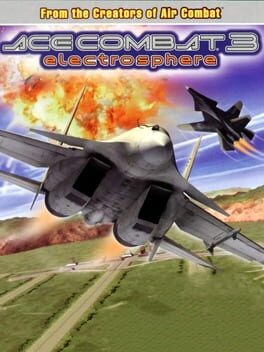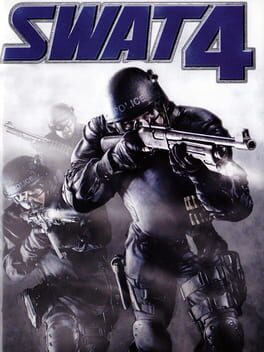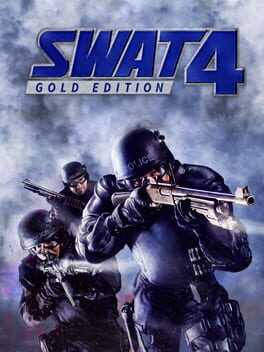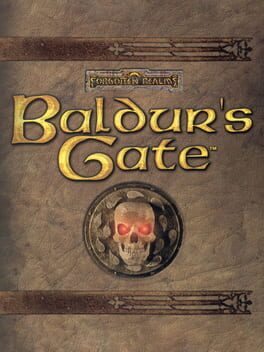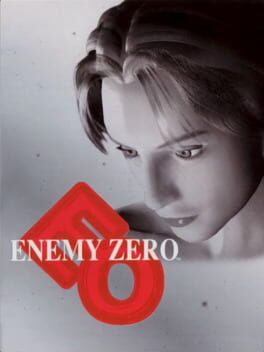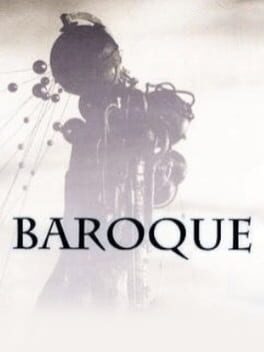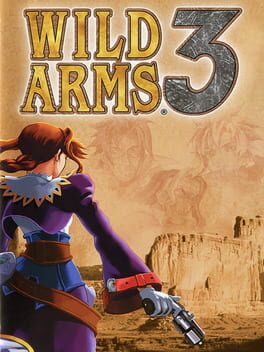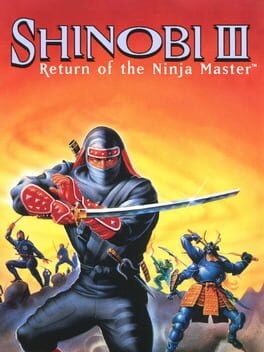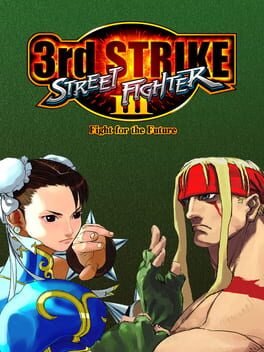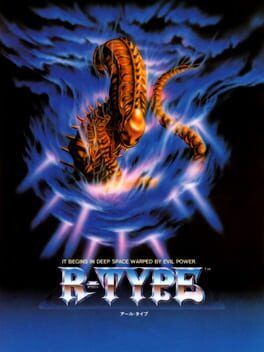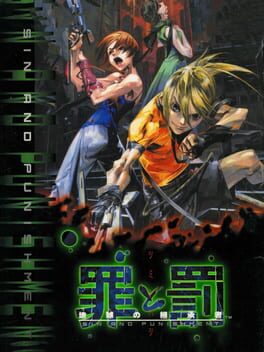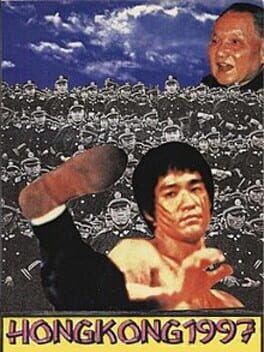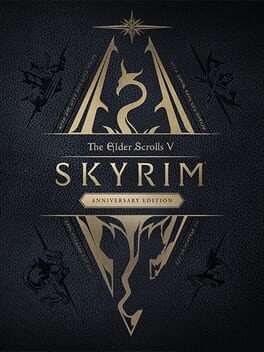Pikadourei
282 Reviews liked by Pikadourei
This is getting a new, from the ground up translation releasing on the 24th anniversary (May 27th), I suggest holding off until then for those interested in it like myself.
If you're wondering what the benefits will be over the Project Nemo team, it'll translate contents of the AppendDisc and Mission 00, among other new benefits.
UPDATE: It's out now!
If you're wondering what the benefits will be over the Project Nemo team, it'll translate contents of the AppendDisc and Mission 00, among other new benefits.
UPDATE: It's out now!
SWAT 4
2005
SWAT 4: Gold Edition
2006
Acquire this game, put it on the highest difficulty, and play the first level. It's that good. Despite the dubious idea of a police FPS, this game portrays the far more paranoid and anxious side of CQC than any other shooter released. Not to demean other shooters as being juvenile or unrealistic, as SWAT is far from a realistic game itself, but what it is, and what makes it unique, is that it's a focus on the psychological aspects of a first-person shooter without overt narratization or storytelling. Put less pretentiously, it's like watching incredibly loud and extremely tense SWAT arrest videos on youtube over and over again, but (ostensibly) divorced from America's gross socio-political context and the dubious idea of a "non-violent" police force. It's exhilarating.
Baldur's Gate
1998
Fallout came out over a year earlier and does almost everything better, the main exception being how companions are handled. While I do find this game's combat more fluid than Fallout's, the encounter design is, more often than not, fucking abominable and ends up making the combat as a whole feel worse as a result. This would be a friendship ruiner if it were an actual D&D campaign, maybe even a cause for justifiable homicide. I'll give it props for its cultural impact and for cementing BioWare's place in video games, but that's about it.
Enemy Zero
1996
most horror games put on the facade of "disempowering the player" but from resident evil to clock tower to penumbra/amnesia to alien isolation or whatever this game might remind you of, it's never actually true.
but in Enemy Zero, you really are fucked from start to finish. end paragraph
anyone who's uttered any variation of "difficulty in video games" should play this. no fast forwarding or save states. make your own maps. normal difficulty. report back within the hour
but in Enemy Zero, you really are fucked from start to finish. end paragraph
anyone who's uttered any variation of "difficulty in video games" should play this. no fast forwarding or save states. make your own maps. normal difficulty. report back within the hour
Baroque
1998
Baroque is artistic in its approach to game design and achieves an immensely dreadful atmosphere by combining its bleak aesthetics with simple but arduous gameplay. The objective is simple: make it to the bottom of the tower, but your success can be largely dependent on your luck with random items. You learn bits and pieces about the world through context rather than explanation, which is an approach to storytelling that I've always appreciated. Masaharu Iwata's grim sound arrangements are the perfect backdrop for this experience, and contribute so much to the pure isolation I feel while playing. I felt similar emotions while watching the anime series "Texhnolyze" years ago, but that story has much more of a concern for society than I can say for Baroque. However, this is the kind of game that different people will read in different ways. There are definitely allusions to problems of human civilization, but I find that Baroque is more concerned with understanding Being and the self. This isn't the sort of media I draw concrete conclusions from; I just find tremendous enjoyment in playing it repeatedly while considering any or all of the pieces of this incredible composition.
Wild Arms 3
2002
in kingdom hearts chain of memories, sora is looking for riku and king mickey. he climbs a tower and while he does it, he starts to lose his memories. we learn, then, how memory is perhaps the most important thing that we, as human beings, have. to be honest, the sickness that scares me the most is alzheimer. the fact that someone can totally forget who i am or that i can forget everyone else is just... terrible.
wild arms 3 is a videogame all about memories. your party is made of a girl haunted by memories of her missing dad, carried by the feeling of, one day, finding him; a guy from a lineage of ancient people, who does not want to accept his 'fate' and follow what the memory of his people say is right, but rather, create new memories by himself; a boy that hasn't any memory from before he becomes a drifter (wild arms' mercenary), and is edgy because, huh, he is not really sure of who he is; and a middle age man, historian, looking for the past memories from the planet. while the game has every single aspect that a jrpg story has (criticizes colonialism, goes full kill-a-god mode, anime tropes (not the criminal ones!), learning how to be friends with strangers you just met, etc.), it never loses focus and, in the end, concludes every character arc and its message.
it can be rough around the edges sometimes, yeah. while it does have a lot of interesting stuff, the way it is presented is kind of archaic and can be a little difficult to fully understand everything. the dungeons are very creative and have some kind of zelda progression, in the way that you almost always have some kind of puzzle to progress and a new item or gimmick to utilize. it plays very well with the camera and perspective too. at the end, tho, it gets a little tiring. the game is very "anime" in a sense that not only is, in fact, directed by an anime director and screenwriter (which give the scenes very cool framings!) but also that is paced in a very episodic way. it gives vibes from a 2000s anime that you would probably love as a teenager but can be tiring if you play this very straightforwardly.
however! it was a very special game to me. it bothered me sometimes but made me think a lot about how i see games and if i am really positive about almost everything i consume or just don't have good taste -- in the end, this critical-existencial-crisis does not matter! what i love about living is having great memories about everything i do and learning how to take care of the bad ones, and this goes for gaming, too. wild arms 3 will forever be a good memory for me, just as this adventure will be for virginia, gallows, jet and clive.
wild arms 3 is a videogame all about memories. your party is made of a girl haunted by memories of her missing dad, carried by the feeling of, one day, finding him; a guy from a lineage of ancient people, who does not want to accept his 'fate' and follow what the memory of his people say is right, but rather, create new memories by himself; a boy that hasn't any memory from before he becomes a drifter (wild arms' mercenary), and is edgy because, huh, he is not really sure of who he is; and a middle age man, historian, looking for the past memories from the planet. while the game has every single aspect that a jrpg story has (criticizes colonialism, goes full kill-a-god mode, anime tropes (not the criminal ones!), learning how to be friends with strangers you just met, etc.), it never loses focus and, in the end, concludes every character arc and its message.
it can be rough around the edges sometimes, yeah. while it does have a lot of interesting stuff, the way it is presented is kind of archaic and can be a little difficult to fully understand everything. the dungeons are very creative and have some kind of zelda progression, in the way that you almost always have some kind of puzzle to progress and a new item or gimmick to utilize. it plays very well with the camera and perspective too. at the end, tho, it gets a little tiring. the game is very "anime" in a sense that not only is, in fact, directed by an anime director and screenwriter (which give the scenes very cool framings!) but also that is paced in a very episodic way. it gives vibes from a 2000s anime that you would probably love as a teenager but can be tiring if you play this very straightforwardly.
however! it was a very special game to me. it bothered me sometimes but made me think a lot about how i see games and if i am really positive about almost everything i consume or just don't have good taste -- in the end, this critical-existencial-crisis does not matter! what i love about living is having great memories about everything i do and learning how to take care of the bad ones, and this goes for gaming, too. wild arms 3 will forever be a good memory for me, just as this adventure will be for virginia, gallows, jet and clive.
At the risk of sounding ridiculous, I swear that I did legitimately believe the moment I laid eyes on Street Fighter III: 3rd Strike: Fight for the Future (at the Redondo Fun Factory (RIP) in Southern California) in 2016 that if there were ever a game to convert me into a bona fide frame-counting, arcade stick-wielding, competitive freak-show, it would be the one. I knew it again, more powerfully in 2018 when it appeared before me at the Chinatown Fair Family Fun Center in New York, though neither time could I exactly articulate my belief beyond being enamored with its stunningly beautiful 2D character animation. Three years later, the prophesied freak-show has at last begun to emerge.
Street Fighter III: 3rd Strike: Fight for the Future is tactile, fast, heavy, tactical, dense, and intensely mechanically immersive. For the dedicated player, the depth of its fighting system sparks learning moments and microscopic improvements with every round fought. Win or lose, the growth is palpable, and is better earned here than in just about any game I can think of. Pick any of its masterfully rendered characters (Makoto), and feel as the pattern of their personality (and unique directional inputs) burns its way into your strategic rhythm. Learn the ins and outs of your opponents and their chosen avatars, slip headfirst into some accidental parries, then land one on purpose. It's a canvas for legends, delivered in an audiovisual package that remains nigh unmatched.
Street Fighter III: 3rd Strike: Fight for the Future is tactile, fast, heavy, tactical, dense, and intensely mechanically immersive. For the dedicated player, the depth of its fighting system sparks learning moments and microscopic improvements with every round fought. Win or lose, the growth is palpable, and is better earned here than in just about any game I can think of. Pick any of its masterfully rendered characters (Makoto), and feel as the pattern of their personality (and unique directional inputs) burns its way into your strategic rhythm. Learn the ins and outs of your opponents and their chosen avatars, slip headfirst into some accidental parries, then land one on purpose. It's a canvas for legends, delivered in an audiovisual package that remains nigh unmatched.
Final Fantasy VII
1997
All my life as a Nintendo-clutching child, Final Fantasy VII’s reputation had loomed high and large like the towering remains of an ancient giant. The internet was yet ruled by the previous dynasty of game-people, and its inescapable legacy had been etched into the marble pillars of their digital shrines. In a generation made of generationally-defining masterpieces (or so it went), the wily double-crossing traitors at SquareSoft defected to the PlayStation and unleashed their secret weapon — the most generationally defining-ist game of all. My blood boiled for a feud long ended. I may have only known caricatures and tall tales of its porcupine-haired Hot Topic-lookin’ Link-like, its pioneering the “first death in videogames” (oh, please), its dumpster-esque graphics and its wildly convoluted plot, but that was all I needed to hear. And besides, it was one of those reviled JRPGs. But I’d gone to college and played Chrono Trigger by the time I received a text message while waiting for the subway one cold, January evening. It assured me that Final Fantasy VII was a soaring epic, that it deserved its reputation and, most shocking of all, that it had dethroned perennial front-runner Twilight Princess as his “favorite game.”
Now, yes, Twilight Princess may kinda suck, but coming from this particular text message author, I could not dismiss the thought. This review, my recent awakening to the potential of this genre, and the announcement of Final Fantasy VII’s imminent release on Nintendo Switch all miraculously collided into a Total Eclipse of anticipation. I played Final Fantasy IV in preparation, took a pit stop to flail at Metal Slimes, and at last, in the dead of night, I picked up Final Fantasy VII the instant it became available.
In the six years between IV and VII, cinematography, pre-rendered graphics, and 3D animation weren’t just possibilities, they were being put to use in grand, ambitious spectacles. Removed from the context of their era, those visuals lend themselves to an unmistakable style, a crusty collage of aesthetics delivered with such tenacity that I can’t help but love 'em. The sweeping orchestration of its intro spills over with so much confidence that, for the tiniest microscopic fraction of a second, we’re not worthy. But beneath it all, I could feel the same heart as its ancient predecessor beating within. An act of terrorism, a weathered protagonist, a second job whose conclusion results in a meeting with the last survivor of a magic tribe, a love triangle, a death, a mad scientist, a cosmic entity — but all of them are strengthened by a more experienced staff, reinvigorated by a whole host of new tricks. But of course, with new priorities also come new compromises.
Final Fantasy VII trades in FFIV’s expressive classes for a modular Materia system, leaving characterization to body language and a newly-dynamic dialogue format. Limit Breaks are about all that’s left to get across party personality via gameplay, but it’s sure that those designs and scenarios will be enough to endear the player, because by minimizing the influence and development of their specialties, it gives us free rein to focus on our favorite people. Its three-man battles poked my Chrono Trigger nerve, though they should’ve rattled my Super Mario RPG bones. Without that same commitment to action or an addition to rival the tech system, it translates into an overt simplification; a transparent effort to bump up Cloud’s polygon count. Minigame setpieces ranging from rad to horrible litter the plot, sometimes boneheadedly positioned between affecting story moments. But look at that. As much as I can scrutinize these tottering steps toward a more complete visual experience, I can’t rightly say those moments didn’t reach me.
In its wild world-building, its earnest explorations of life and identity, its most honest character interactions and its simplest plot devices, Final Fantasy VII earned more than my respect, it got my admiration. It makes a whole heap of mistakes, but the passion and excitement of its developers circa 1997 transcends time, it’s infectious. It revels in Blade Runnerish grunge and solemn subjects, but won’t hesitate to fling out the goofiest nonsense with genuine glee. Even when I was laughing at FFVII’s expense, I felt like it was in on the joke. It sold me on its weirdest twists, endeared me to its characters, and swept me up in its melodrama. Most of all, it’s not afraid to say something real. It packs that train full of everything it’s got and rides to the end of the line, blasting Nobuo Uematsu’s incredible soundtrack all the way. For better and worse, Final Fantasy VII is fearless.
Now, yes, Twilight Princess may kinda suck, but coming from this particular text message author, I could not dismiss the thought. This review, my recent awakening to the potential of this genre, and the announcement of Final Fantasy VII’s imminent release on Nintendo Switch all miraculously collided into a Total Eclipse of anticipation. I played Final Fantasy IV in preparation, took a pit stop to flail at Metal Slimes, and at last, in the dead of night, I picked up Final Fantasy VII the instant it became available.
In the six years between IV and VII, cinematography, pre-rendered graphics, and 3D animation weren’t just possibilities, they were being put to use in grand, ambitious spectacles. Removed from the context of their era, those visuals lend themselves to an unmistakable style, a crusty collage of aesthetics delivered with such tenacity that I can’t help but love 'em. The sweeping orchestration of its intro spills over with so much confidence that, for the tiniest microscopic fraction of a second, we’re not worthy. But beneath it all, I could feel the same heart as its ancient predecessor beating within. An act of terrorism, a weathered protagonist, a second job whose conclusion results in a meeting with the last survivor of a magic tribe, a love triangle, a death, a mad scientist, a cosmic entity — but all of them are strengthened by a more experienced staff, reinvigorated by a whole host of new tricks. But of course, with new priorities also come new compromises.
Final Fantasy VII trades in FFIV’s expressive classes for a modular Materia system, leaving characterization to body language and a newly-dynamic dialogue format. Limit Breaks are about all that’s left to get across party personality via gameplay, but it’s sure that those designs and scenarios will be enough to endear the player, because by minimizing the influence and development of their specialties, it gives us free rein to focus on our favorite people. Its three-man battles poked my Chrono Trigger nerve, though they should’ve rattled my Super Mario RPG bones. Without that same commitment to action or an addition to rival the tech system, it translates into an overt simplification; a transparent effort to bump up Cloud’s polygon count. Minigame setpieces ranging from rad to horrible litter the plot, sometimes boneheadedly positioned between affecting story moments. But look at that. As much as I can scrutinize these tottering steps toward a more complete visual experience, I can’t rightly say those moments didn’t reach me.
In its wild world-building, its earnest explorations of life and identity, its most honest character interactions and its simplest plot devices, Final Fantasy VII earned more than my respect, it got my admiration. It makes a whole heap of mistakes, but the passion and excitement of its developers circa 1997 transcends time, it’s infectious. It revels in Blade Runnerish grunge and solemn subjects, but won’t hesitate to fling out the goofiest nonsense with genuine glee. Even when I was laughing at FFVII’s expense, I felt like it was in on the joke. It sold me on its weirdest twists, endeared me to its characters, and swept me up in its melodrama. Most of all, it’s not afraid to say something real. It packs that train full of everything it’s got and rides to the end of the line, blasting Nobuo Uematsu’s incredible soundtrack all the way. For better and worse, Final Fantasy VII is fearless.
R-Type
1987
This game's execution of setpieces and mechanics have an insane amount of foresight for 1987. Its historical significance can't be stated enough.
But it's also just, disgustingly cheap, in ways that just aren't fun to engage with. Stage 4 is the first major barrier to progression, and it gets even worse starting at stage 6. And honestly, the checkpoint system blows and I don't think it suits this game. I can't be expected to learn these extremely specific enemy patterns if gameplay completely freezes and resets after a single hit.
Infinite Mode on Dimensions EX was the only reason I finished this lol
But it's also just, disgustingly cheap, in ways that just aren't fun to engage with. Stage 4 is the first major barrier to progression, and it gets even worse starting at stage 6. And honestly, the checkpoint system blows and I don't think it suits this game. I can't be expected to learn these extremely specific enemy patterns if gameplay completely freezes and resets after a single hit.
Infinite Mode on Dimensions EX was the only reason I finished this lol
